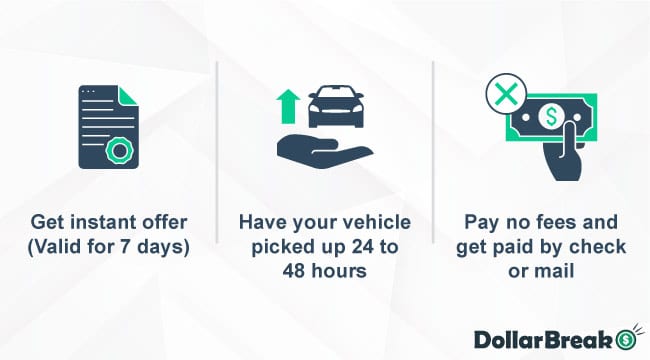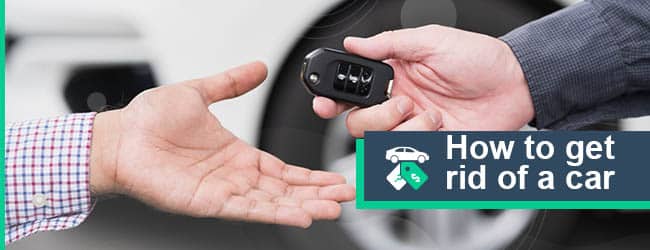Quick Answer:
The best way to get rid of a car is to sell it online to car-buying companies like Peddle, Wheelzy, or CarBrain.
Selling online allows you to get paid within 24 hours of leaving your home.
Moreover, selling cars online is a totally free and secure way to get rid of the car.
Key Takeaways:
- Find out your car’s value before selling it. Use online tools like Kelley Blue Book or Edmunds.
- Request multiple quotes online to choose the best offer.
- To get rid of the car, you will need to provide a Certificate of Title.
- Sign a Bill of Sale to disclose any problems and protect yourself.
Best for Older & Damaged Cars

Buys used, damaged or junk cars
Free tow and no hidden fees
Pays by ACH trasfer or check
Top Pick for Junk Cars

Free, no-obligation cash offers
Offers free paperwork service
Pays on the spot upon pick up
When is it Time to Get Rid of the Car?
Deciding when it’s time to part with your car involves assessing its condition, cost of maintenance, and the value it brings to your life. Key indicators suggesting it might be time to say goodbye to your vehicle include:
- High Maintenance Costs: If the vehicle’s repair and maintenance costs over a period, such as the past two years, significantly outweigh its current value or impact your monthly budget negatively, it could be time to consider alternatives.
- Mechanical Failures and Safety Concerns: Frequent breakdowns or safety issues that compromise your driving experience are strong signs that your vehicle may no longer be worth keeping.
- Inefficiency: Older cars often have poorer fuel efficiency and higher emissions compared to newer models, which can lead to increased running costs and environmental impact.
- Lifestyle Changes: A change in your lifestyle or needs, such as an expanding family, might render your current vehicle impractical.
- Advancements in Technology: You might be missing out on improved safety features, fuel efficiency, or technological advancements offered by newer models.
- Cost-Benefit Analysis: Consider the residual value of your car against the cost of keeping it running. A diminishing return on investment indicates it’s time for an update.
3 Best Places to Get Rid of a Car
The best way to get rid of a car is by selling it online.
To initiate, simply submit a request for a cash offer by completing an online form, which entails providing details such as the car’s make, model, trim, title type (whether clean, salvage, or rebuilt), mileage, zip code, and the car’s condition.
Shortly after, you’ll receive an instant cash offer, typically valid for up to seven days.
1. Peddle
Peddle offers a convenient solution for selling cars in any condition, including those with water damage, non-running, accident-damaged, missing parts, high mileage, and salvage or junk status.
They provide instant quotes over the phone and offer free towing within 48 hours after accepting an offer, ensuring sellers receive payment upon car collection.
2. Wheelzy
Wheelzy operates seven days a week and specializes in purchasing used and damaged cars from 1981 onwards, excluding motorcycles, two-wheeled vehicles, ATVs, campers, and RVs.
They emphasize a hassle-free process, providing offers within minutes and offering free towing from the seller’s location, with instant payment made via cash or check.
3. CarBrain

CarBrain focuses on a quick and secure selling process, buying cars in more than seven conditions, including broken, parted, non-running, junk, salvage, scrap, and those with mechanical issues or damaged by falling objects.
They promise a fast cash offer after filling out an online form, with the possibility of receiving cash for the car in under 48 hours and up to 7 days to accept their offer.
How to Estimate a Car’s Value?
By analyzing data from different sources and considering the intrinsic factors that influence a car’s value, sellers can not only set a competitive price but also maximize the returns.
Factors like the car’s make, model, year, condition, and even your location will impact the market value.
1. Car Valuation Websites
Platforms like Kelley Blue Book, Edmunds, and J.D. Power collect data from numerous sources, including dealership sales, private transactions, and auction outcomes.
By inputting specifics about your vehicle, such as make, model, year, mileage, and condition, you’ll receive estimates tailored to your car’s details, reflecting its trade-in value, private sale potential, and retail price.
2. Online Car Listings
Websites such as CarGurus and AutoTrader offer a real-time glimpse into the market.
By comparing your vehicle to similar ones listed based on criteria like age, mileage, and condition, you can gauge how your car compares and adjust your pricing strategy accordingly.
The listing duration of similar cars can also offer clues about pricing effectiveness.
3. Online Car Buying Companies
Fast and increasingly popular companies like Peddle, Wheelzy, and CarBrain provide immediate cash offers, giving you a baseline for what you might expect in a quick sale scenario.
To get an offer, you only need to provide basic car details: make, model mileage, and description of condition. The offer includes free car towing, waiting 48 hours, and paperwork handling.

How Do You Get Rid of a Car Without a Title?
If you wonder how to get rid of a car without a Tilte, keep in mind that selling or donating such a car is illegal in all states.
Nonetheless, there are a few ways to navigate through this:
- Apply for a Duplicate Title: Visit your local DMV office or their website to apply in person or online. You will need to provide your driver’s license or ID, VIN, and license plate number. The cost for a duplicate title varies by state, with fees ranging from $5 to $60. The processing and delivery of the duplicate title typically require 7-10 business days.
- Contact the Previous Owner: If the car Title was not transferred to your name due to oversight or error, contact the previous owner. Arrange to meet at the DMV to complete the title transfer application together.
- Apply for a Replacement Title: If you’ve received a car as a gift or through inheritance, request the original owner to transfer the Title to your name. Alternatively, you can use an inheritance document to prove the ownership. Replacement Titles can cost anywhere from $15 to $40.
- Utilize a Bill of Sale: some states allow you to provide a bill of sale as proof of ownership instead of a Title for vehicles over a certain age (usually 15+ years).

Paperwork Needed to Get Rid of a Car?
The paperwork needed to sell a car varies on the state, but a Certificate of Title is always required.
Depending on your state, additional documents such as a signed and notarized bill of sale, a VIN inspection, and a current emissions test report might be necessary.
1. Certificate of Title
A Certificate of Title is a state-issued document verifying a vehicle’s ownership and is necessary for its legal sale and ownership transfer.
To sell a vehicle, the seller must complete and sign the “Seller’s section” on the back, including the buyer’s details, odometer reading, sale price, and date.
The seller signs in the “owner’s signature” area, and the buyer must sign their section to finalize the ownership transfer.
In case of a lost Title, submit a “Duplicate Title Application” at your local DMV. The fee for a replacement title ranges from $5 to $60, depending on the state, and you should expect to receive it within 7-10 business days.
2 Bill Of Sale
In some states, a bill of sale is required to transfer vehicle ownership. Although not always obligatory, it’s recommended to sign one to protect both the seller and buyer against future disputes.
Moreover, in some states, a bill of sale may be accepted in place of a Certificate of Title for older vehicles if the original document is missing or has been lost.
This exemption is specific to these states:
- Alabama – 35 years or older
- Connecticut – 20 years or older
- Georgia – the year 1986 or older
- Kansas – the year 1949 or older
- Maine – year 1994 and older
- Maryland – 20 years or older
- Massachusetts – year 1980 and older
- New Hampshire – year 1999 or older
- Ohio – 25 years or older
- Rhode Island – year 2001 and older
- Vermont – 15 years or older
3 Emissions Test
In some states, a valid emissions test certificate is necessary for transferring a vehicle’s title. This test usually takes about 20 minutes and costs between $10 and $30.
If the vehicle fails the emissions test, it can still be sold, but the buyer might face registration challenges.
To avoid disputes, any failed inspections should be noted in the bill of sale, clarifying that the vehicle is sold “as is” or as “non-operational.”
4. VIN inspection
The need for a VIN inspection for used cars being sold varies by state; it might be mandatory for all used vehicles or just for certain types, like those from another state or reconstructed or salvaged cars.
To determine if your car needs a VIN inspection for sale, contact your state’s DMV or visit their website for specific VIN inspection criteria.
5. Report the Sale
In certain states, sellers are required to notify the DMV of the vehicle sale.
Most states offer the option to submit this notification online or through mail, though some situations may necessitate a visit to the DMV office.
The required details for this process include:
- Your name and contact details
- The buyer’s name and contact information
- Vehicle’s license plate number
- Make, model, year, and color of the car
- VIN
- Odometer reading at the time of sale
- Date of title transfer
Is it Worth Selling the Car for Parts?
Selling your car for parts can be a financially wise decision if the parts’ value exceeds the car’s value as a whole.
This approach might be particularly lucrative if you’re able to sell the parts individually. Working with a local salvage yard could maximize your earnings.
Generally, if your car is only fetching offers between $300-$500, selling it for parts is considered worthwhile.

How Do You Get Rid of a Car With a Loan?
Depending on your situation and goals, getting rid of a car with a loan on it involves a few steps and options.
Here are the main steps to sell a car with a loan:
- Find out your payoff amount.
- Find out your car’s value.
- Find out your car’s equity.
- Disclose loan status to the buyer.
- Take care of the paperwork.
Selling the car or paying off the loan can have minimal to positive impacts on your credit, assuming all goes smoothly.

How Long Does it Take to Get Rid of a Car?
Selling a used car typically takes around 52 days when selling to a private buyer.
The process involves several steps, including cleaning the car, taking high-quality photos, researching the vehicle’s market value, listing it online with a detailed description, responding to inquiries, arranging test drives, and handling the paperwork.
The time it takes to sell a car varies on the following factors:
- Car’s condition
- Mileage
- Market demand
- Selling platform
Selling privately might yield a higher price but takes longer, whereas online services offer a quicker sale at possibly lower prices.
How to Get Rid of a Deceased Person’s Car?
Selling the car of a deceased person involves a multi-step legal process, primarily focused on ensuring the lawful transfer of ownership.
Here are the condensed steps:
- Locate the will
- Initiate probate
- Settle unpaid fees
- Transfer the Title
- Gather required paperwork
- Choose a selling method
- Cancel insurance
Throughout this process, it’s crucial to comply with legal requirements and consult professionals as needed to avoid complications.





